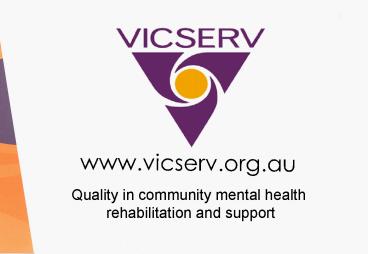Quality in community mental health - PowerPoint PPT Presentation
1 / 13
Title:
Quality in community mental health
Description:
The Victorian experience. Worker skill sand competencies. Effective linkages... Victorian profile of workers. Invest in non-clinical PSR and support. It's cheap. ... – PowerPoint PPT presentation
Number of Views:29
Avg rating:3.0/5.0
Title: Quality in community mental health
1
www.vicserv.org.au
Quality in community mental health
rehabilitation and support
2
Building a. community based.
skilled.. rehabilitation and
support. recovery focused.. component
of the mental health service system. In
15 minutes
3
Some key issues
- The case for NGOs as service providers in
rehab and recovery services - Evidence and outcomes
- The term rehabilitation
- What are these services doing ? The Victorian
experience - Worker skill sand competencies
- Effective linkages with a range of other
services - investment by the state and by opinion makers
and opinion leaders.
4
Psychiatric Disability Support Services in
Victoria
PDSS General CHC AMHS LGA
5
The case for NGOs as service providers in rehab
and recovery services.
- Not NGOs NCOs. Why clinical services ?
- Community based orgs function differently to
clinical services. They should function
differently. These differences enhance the
service system - Community links
- Different organisational culture
- Focus on social/community outcomes
- Non statutory responsibilities
- Different governance focus
- Different staff profiles
6
Evidence and outcomes
- Evidence case made
- Outcomes
- - Vic experience of values based system
development. Not uncommon nor unsuccessful in
SACS. Uncommon in medicine. - - Research Social vs medical
- - Measure what ? Process vs outcome
- - Human services fields where outcomes are
clinet driven and unique are suited to
measuring process, until sophisticated, or the
tail wags the dog - - Later work on outcomes
- - how do you measure the acquisition of hope ?
And who would be good at this work ?
7
Terminology
- Psychosocial rehabilitation and use of term
rehab - Support/ differential client need
- Recovery as a journey/process, and the
generation of hope. - Appropriation of terms by the clinical services
sector - Illness/disability. Services are disability
focused, on what happens when a person interacts
with their community. Whoo would be good at this
work?
8
Effective linkages with a range of other
services.
- Cornerstone Project Clinical services/PDRS
Protocols - Links with other agencies diverse and complex
client needs i.e. general health, dual
diagnosis etc. GPs, community health,
employment, training, housing, housing, housing
etc - Vertical/horizontal integration. Are acute care
providers good at primary, secondary and tertiary
care ? - Current trends in this area
9
Worker skills. Who fits this criteria ?
- Working with the client to travel from
resignation, through despair, to generate hope
and possibility - Maintaining contact, and talking and listening
when things arent working - Linking into local groups of all types
- Referring to clinicians occasionally
- Creating goals and working with the consumer to
monitor those goals - Engaging with carers in a partnership
10
PSR principles what orgns and what workers are
best suited to this ?
- Focus on strength rather than pathology
- Breaking down professional shields and barriers
- Whole of environment approach
- Changing the environment.
11
Victorian profile of workers
- Qualified and skilled
- From a range of disciplines
- Ex-clinicians report greatest challenges in
adjusting to PSR - Includes nurses, OTs, psychologists, community
devt workers, social workers - None practice their discipline. They share the
discipline of PSR.
12
Summary
- Invest in non-clinical PSR and support. Its
cheap. - Clinical leaders and opinion makers support the
process, or at least step aside - Invest in training for workers
- Focus for at least 3 years on process and not
outcomes - Ensure strong links between Non clinical and
clinical services, but not control. Other links
more relevant to effective consumer outcomes.
13
www.vicserv.org.au
Quality in community mental health
rehabilitation and support































